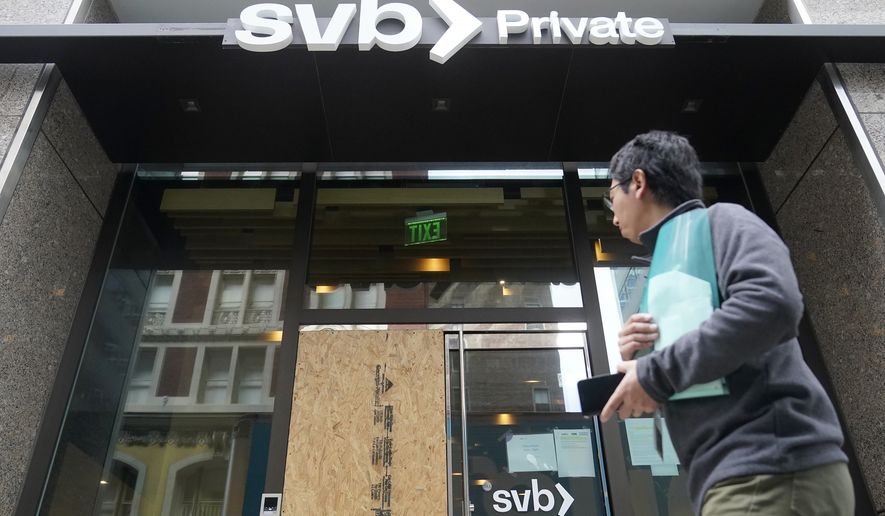The Justice Department and the Securities and Exchange Commission are investigating Silicon Valley Bank’s collapse and its top executives selling stocks in the weeks before the California lender was taken over by regulators.
The separate investigations are in their preliminary phases after the run on deposits last week at SVB, the nation’s 16th-largest bank. The probe involves the Justice Department’s fraud prosecutors in Washington and San Francisco, The Wall Street Journal first reported Tuesday, citing people familiar with the probes.
Regulatory filings show that SVB CEO Gregory Becker exercised options on 12,451 shares on Feb. 27 and sold them the same day, netting about $2.3 million.
Daniel Beck, chief financial officer of SVB, sold about $575,000 worth of shares of SVB Financial, also on Feb. 27, unloading about one-third of his holdings. The sales were carried out under prescheduled insider trading arrangements called 10b5-1 plans, according to the report.
The fall of SVB, as well as crypto-focused Signature Bank in New York, has prompted emergency rescue action from regulators and roiled financial markets. Stocks rebounded on Tuesday, including bank shares, with all three major indexes up at least 1%. The Dow Jones Industrial Average closed up 336 points, or 1%, snapping a five-day losing streak.
The turmoil surrounding the bank collapses also is complicating the Federal Reserve’s task of lowering inflation through a series of interest-rate increases that began a year ago. Inflation eased slightly in February but remained high, the Bureau of Labor Statistics reported Tuesday.
The Consumer Price Index rose 6% year-over-year in February, compared with a 6.4% annual rate in January. On a monthly basis, prices increased 0.4% over January, down a tick from the 0.5% monthly increase from December.
Core inflation, which excludes volatile food and energy prices, rose 5.5% year-over-year. Inflation has fallen from a high of 9.1% last June, but it is still far above the Fed’s target rate of 2%.
The slightly smaller increase in inflation comes as the Fed prepares to meet next week to consider another hike in interest rates. Even though prices are rising much faster than the Fed wants, some economists expect the central bank to suspend its yearlong streak of interest rate hikes due to concerns about the impact on the banking system.
Moody’s, one of the big three ratings firms, dropped the outlook for the U.S. banking system from stable to negative, warning of a “rapid deterioration in the operating environment.” It said there are still concerns for the overall banking industry, despite the Federal Reserve establishing a facility to ensure that banks with liquidity problems would have access to cash and Treasury backstopping the program with $25 billion.
“Banks with substantial unrealized securities losses and with non-retail and uninsured U.S. depositors may still be more sensitive to depositor competition or ultimate flight, with adverse effects on funding, liquidity, earnings and capital,” Moody’s said Monday.
Republicans have accused President Biden of contributing to the bank collapses through high spending, saying the Fed’s interest-rate hikes to lower chronic inflation caused short-term rates on bank deposits to rise faster than the banks’ long-term investments.
Former Treasury Secretary Larry Summers said Silicon Valley Bank “committed one of the most elementary errors in banking: borrowing money in the short term and investing in the long term.”
“When interest rates went up, the assets lost their value and put the institution in a problematic situation,” he tweeted.
Mr. Biden, whose administration worked out a rescue program over the weekend to spare bank depositors from losses, said annual inflation “is down by a third” from last summer while the unemployment rate remains near a 50-year low.
“As challenges in the banking sector remind us, there will be setbacks along the way in our transition to steady and stable growth,” Mr. Biden said in a statement Tuesday. “But we face these challenges from a position of strength.”
Republicans said Mr. Biden’s proposed budget for fiscal 2024, which calls for an 8% spending increase and more than $5 trillion in tax hikes, would only worsen the economic uncertainty.
“Bidenflation is breaking the banks and bankrupting families who can’t afford the falling wages, higher prices, and tax increases Biden’s reckless policies created,” said Republican National Committee Chair Ronna McDaniel. “Instead of trying to ease the economic burden on American workers, Biden is doubling down and asking families to foot the bill for his $6.9 trillion tax-and-spending spree.”
House Ways and Means Committee Chairman Jason Smith, Missouri Republican, said American families “have lost two months of pay to inflation.”
“Yet the president is embracing further rounds of fiscal and economic calamity including an additional $4.7 trillion in tax increases on families, farmers, and job creators to fund the Democrats’ welfare for the wealthy agenda,” he said.
• This article is based in part on wire-service reports.
• Dave Boyer can be reached at dboyer@washingtontimes.com.




Please read our comment policy before commenting.